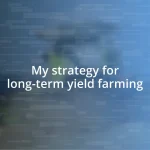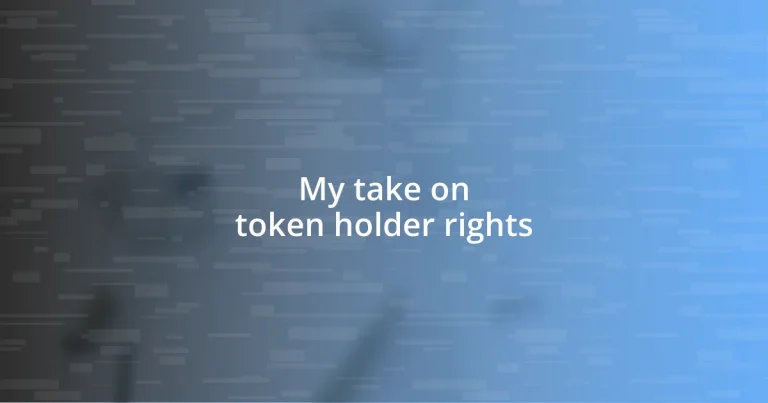Key takeaways:
- Token holder rights empower individuals by granting them governance participation, transparency, and financial incentives within a blockchain ecosystem.
- Legal frameworks vary by country, influencing token ownership rights and project operations, with some jurisdictions promoting innovation while others enforce strict regulations.
- Active engagement in governance fosters community trust and collaboration, allowing token holders to propose changes and influence the project’s future directly.

Understanding token holder rights
Token holder rights are essentially the privileges that come with owning a token within a blockchain ecosystem. These rights can vary widely depending on the project, but they often include voting on governance matters, access to certain features or services, and even profit-sharing opportunities. I remember the excitement I felt when I first learned that holding a specific token would allow me to influence decisions in a decentralized community. Isn’t it empowering to think you have a say in the direction of a project you believe in?
As projects grow and evolve, understanding these rights becomes integral. Many token holders find themselves wondering if they truly grasp the implications of their ownership. I’ve faced that concern myself—am I maximizing my investment potential? This thought often leads me to dive deeper into the fine print of token documentation, discovering nuances that can significantly impact my decision-making.
I also recall a time when I participated in a governance vote that ultimately decided the fate of a project’s next features. The rush of knowing my voice mattered added a layer of emotional investment to my holdings. Have you experienced something similar? The reality is, being aware of your rights can transform you from a passive investor into an engaged member of a community, making the entire journey that much more rewarding.

Importance of token holder rights
Understanding the importance of token holder rights is crucial for fostering a healthy and engaged community. When I first stumbled upon the potential of token governance, I felt a newfound sense of ownership that transformed my perspective as an investor. It’s fascinating how informed token holders can influence direction and strategy, essentially guiding the project’s evolution to align with their values and interests.
Here are some key reasons why token holder rights are essential:
- Empowerment: Token holders can voice their opinions and vote on key decisions, fostering a sense of ownership.
- Transparency: Rights often include access to project information, ensuring holders make informed choices.
- Incentives: Some tokens provide profit-sharing and other financial incentives, enhancing the value of holding tokens.
- Community Building: Engaged token holders contribute to a stronger, more vibrant ecosystem.
- Innovation: Holder feedback can lead to new features, driving continuous improvement of the project.
Reflecting on my journey, I’ve seen firsthand how these rights can mobilize communities and spark innovative ideas. When I participated in feedback sessions, it was invigorating to witness how my input, alongside that of others, could shape the platform’s development. It’s moments like these that deepen my connection to the project, highlighting the true power of token holder rights in creating a collaborative environment.

Legal frameworks for token holders
Understanding the legal frameworks surrounding token holders is a fascinating aspect of the blockchain landscape. From my perspective, these frameworks can significantly influence the capabilities and protections afforded to token holders. For instance, jurisdictions such as Switzerland and Malta have established regulations that not only recognize tokens as assets but also delineate the rights associated with them. This legal backing lends considerable weight to the idea of token ownership, making me feel more secure in my investments.
I’ve noticed that the regulatory environment can dramatically affect how projects operate and engage their communities. For example, when a token is classified as a security, it typically subjects the project to stricter compliance measures. I remember reading about a project that began as a utility token but had to pivot to a security token when regulators stepped in. Watching the team navigate this transition was a lesson in adaptability, emphasizing how legal definitions can change the game for token holders.
When examining different international legal perspectives, I can’t help but appreciate the comparative nuances. Some countries embrace a more libertarian stance on token management, allowing for greater latitude in project governance. In contrast, others might impose stringent rules that mitigate risk but can inhibit innovation. This range of possibilities is intriguing. It makes me wonder how these different legislative approaches can shape the future of token ownership across the globe.
| Country | Regulatory Approach |
|---|---|
| Switzerland | Proactive and supportive; recognizes tokens as assets |
| United States | Restricted; treats many tokens as securities |
| Malta | Balanced; promotes innovation while ensuring compliance |
| Singapore | Business-friendly; clear guidelines for token classification |

Rights associated with token ownership
Token ownership carries several inherent rights that can empower individuals like me in meaningful ways. One significant aspect is the ability to participate in governance. I remember the first time I cast a vote on a major protocol change; it felt surreal knowing my voice could impact the community’s direction. This empowerment isn’t just about having a say; it builds a connection between holders and the project, making us stakeholders rather than mere spectators.
Another vital right is access to information. As token holders, we often have the privilege of reviewing project updates, financial data, and strategic plans. In my early days exploring this space, I was pleasantly surprised by the transparency that many projects offered. It made me feel part of something larger, knowing I could track the project’s health and make informed decisions about my investments.
Finally, let’s not overlook the financial benefits tied to token ownership. Some projects offer profit-sharing or staking rewards, giving us tangible incentives to support the ecosystem. I can recall the moment I received my first staking reward; it was both exciting and affirming. I realized then that being a token holder meant not just investing money but also participating in a robust financial ecosystem, which further fueled my enthusiasm for the project. Isn’t it empowering to think that our engagement can directly enhance the project’s success — and our own financial well-being?

Active participation in governance
Active participation in governance is a thrilling component of being a token holder. I still remember the excitement I felt when I joined a community forum to discuss potential upgrades. Engaging in these conversations made me realize how much weight our collective decisions carry. It’s as if every vote is a thread weaving the fabric of the project’s future, and my voice contributes to that tapestry.
The ability to propose changes is another amazing aspect. Last year, I decided to suggest a feature that could improve user experience, and I was astonished when it gained traction. It felt personal and rewarding to see my idea spark discussions and ultimately be included in a roadmap. Isn’t it incredible how a single voice can create ripples in a larger community?
Moreover, participating in governance builds trust among community members. When I voted on a critical issue, I felt a sense of camaraderie with other token holders who shared my commitment to the project. We weren’t just investors; we were stakeholders shaping our collective destiny. This sense of belonging is invaluable, fostering a community that thrives on shared ambitions and mutual respect. What’s your experience with governance? Have you ever felt that power?














